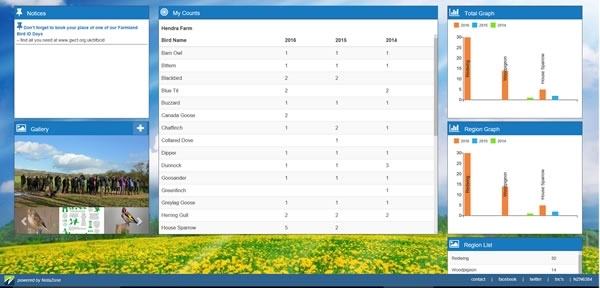The Game & Wildlife Conservation Trust (GWTC) will be taking its very successful Big Farmland Bird Count (BFBC) to a completely new level in February 2017 by adding a unique software programme that makes it easier for farmers to record and access their precious long-term farmland bird data.

Jim Egan from the GWCT sees this as a huge advancement for all future wildlife surveys. He said, “The NotaZone software, developed by Bristol-based Agrantec, offers huge benefits for those taking part in the count. For the first time, farmers, gamekeepers and others taking part in the survey will have access to their own personal long-term data on the birds they have counted on their land. It also means that in future years they will be able to monitor trends, giving them a better understanding of what conservation measures they need to implement to help their farmland birds. We are really thrilled with this innovation and feel that it will help farmers to become even more engaged in looking after their farmland birds in the future.”
NotaZone was originally developed as a record-keeping and information management tool for farmers and food processors and has been specially adapted for this important annual farmland bird count.
As well as having a long-term record of the birds that have been recorded, the new software (which is free to all those taking part and works on smartphones, laptops and desktops), enables users to access detailed hints and tips on the specialised conservation needs of individual bird species recorded during the count. More detailed information sheets on 60 different species will also be available to all those taking part in the count.
Jim Egan said, “Having immediate feedback through the software means that land managers can make really targeted changes to help their threatened birds, such as putting up nest boxes in the right place, providing over-winter feeding sites or creating ideal nesting conditions.”
Martin Coates, CEO of Agrantec, which has adapted the NotaZone software with the GWCT, said, “This is very much a collaborative project, that aims to make data collection and the sharing of this information more focused, efficient and permanent. Farmers will have complete ownership of their data, enabling them to build their own long-term record of their achievements. In the world of wildlife surveys, this is very unusual. Over time they will capture invaluable historical data on what is working, and how conservation efforts can be improved or adapted. This can then be easily shared with others who wish to innovate for the benefit of their birds.”
This is the fourth year that the Big Farmland Bird Count has taken place and it is an easy way for participants to find out about the birds they have on their land. Farmers, gamekeepers and landowners are crucial to the survival of many farmland bird species and the 2017 BFBC is an opportunity to demonstrate the positive effect of farmland management.
Over 970 farmers took part in 2016, recording 130 species of birds across approximately 900,000 acres. This year the GWCT is aiming to at least double the number of people taking part.
The GWCT’s Big Farmland Bird Count will take place between Friday 3rd February and Sunday 12th February 2017. All those registering to take part will have free access to the NotaZone software tool enabling them to start building their own personal record. To take part or for further information, please visit : www.gwct.org.uk/bfbc
GWCT’s Big Farmland Bird Count is generously sponsored by BASF and delivered in partnership with the FWAG Association, LEAF (Linking Environment and Farming), NFU and CLA.
Notes to editors
The Game & Wildlife Conservation Trust – providing research-led conservation for a thriving countryside. The GWCT is an independent wildlife conservation charity which has carried out scientific research into Britain’s game and wildlife since the 1930s. We advise farmers and landowners on improving wildlife habitats. We employ more than 60 post-doctoral scientists and other research staff with expertise in areas such as birds, insects, mammals, farming, fish and statistics. We undertake our own research as well as projects funded by contract and grant-aid from government and private bodies.
For information, contact:
Eleanor Williams
Telephone: 07592 025476
Email: press@gwct.org.uk